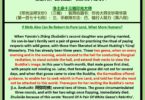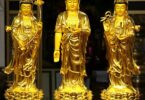[95] How I Did My Best To Guide My Father To Pure Land
Background
My father was diagnosed with early stage colon cancer at the age of 60 and managed to keep it under control for a few years. In 2019, it progressed to an advanced stage, spreading to his lungs. He underwent several types of chemotherapy which slowed it down.
After many rounds of encouragement and persuasion by Aunt S, my parents took the Threefold Refuge (三皈依) with her in late 2019. Despite this, my parents (and siblings) did not learn Buddhism properly or practise chanting regularly, while having mixed Taoist-Buddhist practices in daily life.
(Note 1: While taking of refuge formally expresses willingness to embrace the Buddha’s teachings, whether they are learnt and practised after in another issue. While it is best to have taken refuge, even those yet to have taken refuge formally can reach Pure Land if they have a sincere sense of refuge when mindful of the Buddha, with the Three Provisions of Faith, Aspiration and Practice [信愿行]: https://purelanders.com/2018/02/08/the-three-provisions.)
The illness and treatment weakened my father, causing him to be home-bound and eventually bedridden. During this period, I tried to share the Pure Land teachings with my parents (and sometimes my siblings). I also shared the benefits of being mindful of the Buddha (念佛), encouraging and sometimes ‘nagging’ at my parents to chant the Buddha’s name regularly. However, they were not receptive consistently.
Before Departure
When my father’s health deteriorated drastically in October 2022, the palliative doctor informed that he might depart in the next few days. It was difficult for him to speak and he was unable to eat or drink. He was restless most of the time and in great discomfort. As such, we had to give him medication, which caused him to be unconscious most of the time.
(Note 2: It is best to retain consciousness, to facilitate mindfulness of Buddha. However, this might not be practical if there is too much pain and discomfort for the patient to bear. However, drugs like morphine, which is often used for cancer pain, is best tuned to be just ‘right’ in quantity if possible, as it can cause hallucination, confusion, drowsiness, sedation, nausea and constipation.)
I placed Āmítuófó’s (阿弥陀佛) poster on the wall opposite his bed, so that he could see it when conscious. I turned on the Buddha recitation device (念佛机) by his bedside and encouraged him to listen to it sincerely in his heart while I recited it out ‘on his behalf’. I also encouraged family members and all visitors to chant ‘on his behalf’ when they are at his bedside.
(Note 3: ‘Chanting on someone’s behalf’ is in terms of encouraging and guiding the person to also be mindful of the Buddha, thus being support-chanting [助念], helping to create meritorious virtues [功德] and to lessen suffering. This is while the person guided has to personally be mindful of the Buddha sincerely, be it verbally or mentally, with the Three Provisions, to connect to the Buddha, to be received to his Pure Land.)
I briefed my family on the ‘Important Guidelines: During Dying’ (from the Pure Land Passport book: https://purelanders.com/2015/12/30/important-guidelines-2-during-dying-pure-land-passport-section-4b). On the Rebirth Blanket (往生被), I explained its benefits and clarified on its misunderstandings, but they did not seem comfortable for me to place it on my father. I also placed a copy of the BGRAAM (https://purelanders.com/wake) by his bed, so that they can refer to it when in doubt. This is challenging as none of them have learnt Buddhism well and do not have strong faith in the Buddha and his Pure Land.
(Note 4: Perhaps the other name of the blanket could be used – as the ‘Dhāraṇī Blanket’ [陀罗尼被], with emphasis on its dhāraṇīs’ [i.e. sacred mantras] ability to offer great protection, blessings and elimination of karmic obstacles [业障]. Explaining in this way does not use words associated with death or rebirth, thus lessening misunderstanding that using the blanket might inauspiciously hasten death, as sometimes mistaken. It should be used once in a precarious state – when dying; not just after death.)
Through the affinity of Aunt S with a Buddhist organisation, we invited two monastics to visit my father. They offered guidance (开示) to encourage him to aspire to reach Pure Land, with ‘support-chanting’ (using the Amitābha Sūtra《阿弥陀经》and Āmítuófó’s name). Despite being heavily sedated and weak, he chanted ‘Āmítuófó’ loud and clear twice when they were leaving. I almost burst into tears of joy as it was the first time I heard him chant the Buddha’s name verbally. This great exertion, not once but twice, expressed his Three Provisions firmly too.
(Note 5: For helping the dying, who are short of time, who might have difficulty focusing on that more complex, after offering clear and concise guidance words to urge sincere mindfulness of the Buddha’s name to reach his Pure Land, following with recitation of Āmítuófó’s name will do. While reciting the Amitābha Sūtra creates meritorious virtues, the dying person, if unfamiliar with its teachings, is unlikely to understand the guidance it offers. Recitation of Āmítuófó’s name already creates unsurpassable meritorious virtues. Thus, no benefits are amiss.)
We had a shift system and a night nurse to help take care of my father during his last few days. However, the support-chanting was not seamless as not all family members were able to chant the Buddha’s name.
(Note 6: If there cannot be seamless support-chanting, before taking breaks, there should be reminders to the dying, to take the chanting of the Buddha recitation device to represent one’s support-chanting, and to follow it in the mind. If unable to chant verbally, even sincere listening is sincere mindfulness.)
During And After Departure
During the last night, the nurse and my spouse noticed changes in my father’s skin colour and breathing. Family members were alerted to be by his side. I placed the Rebirth Blanket on him and chanted the Buddha’s name super sincerely, hoping he will connect to Āmítuófó, to be received to his Pure Land. After a few minutes, he took his last breath, looking like he was asleep.
I followed the ‘After Dying’ steps in the Pure Land Passport book: https://purelanders.com/2015/12/30/important-guidelines-3-after-dying-pure-land-passport-section-4c, as we began uninterrupted support-chanting for eight hours. Despite my family not being familiar, with this being their first time practising it, what more from the dying state to eight hours after death, some managed to do so for a couple of hours continuously. We chanted the Buddha’s name so much that some of us continued to ‘hear’ it on the same night later, when there was no device being played, as it was brought to the wake.
(Note 7: This is either due to strong habituated impressions on the mind, or it is the auspicious sign [瑞相] of ‘heavenly music filling the sky’ [天乐盈空], representing connection of the living and/or deceased to the Buddha.)
During support-chanting, some relatives came by to see my father for the last time. There were some noise distractions when they started preparing for the wake. Everyone was reminded to not touch my father’s body or cry in his presence, lest these create magnified physical pain and mental anguish. The process was generally smooth and peaceful.
We arranged for the doctor to certify my father’s death and the undertaker to come after the eight hours of support-chanting. Just before they began their processes, I again offered guidance, urging him to quickly chant the Buddha’s name sincerely, until the Buddha comes, and to follow him. Otherwise, he will experience immense pain when the doctor checks his body, and when the undertaker touches and moves his body for embalming. I tried several times to discourage my mother and siblings from wanting embalmment, but they decided to proceed with it, so that relatives from Malaysia and friends could see him during the wake.
(Note 8: Although there was embalmment, this annotator has never seen a embalmed body’s expression that looked so natural and peaceful. This is in great contrast with most other embalmed bodies seen, which tend to look somewhat unnatural and not so peaceful, which also usually belonged to those who did not have much support-chanting, if any. That said, if the consciousness of the deceased is still present, it can still effect changes in the expression when there is support-chanting offered, even at the wake. An example can be seen at https://purelanders.com/2016/11/16/our-dharma-brothers-clear-present-smile.)
Wake And After
Due to my family’s business in joss paper offerings and dealings with funeral service providers, I was unable to control how the wake was conducted. As mentioned, my family has a mix of Taoist-Buddhist practices, which continued at the wake. There was no backdrop with the Buddha’s image. In place was a collage of my father on his vacations. There was a small Buddha image at his altar. Buddhist chanting, a one-time non-Buddhist chanting and joss paper offerings were offered. Vegetarian and non-vegetarian food were served. Aunt X and her group of friends came on the last morning to offer supposedly ‘Buddhist’ chanting. However, it did not sound like any Buddhist chanting that we have heard before. Towards the end, there was even singing. Furthermore, there was no mention of the Buddha’s name.
(Note 9: For fully Buddhist wakes, there should be more images of the Buddha, with only vegan food offered: https://TheDailyEnlightenment.com/veg, and no non-Buddhist rituals, which might confuse the deceased. While it might be challenging, not with all cases successful due to different karmic affinities and conditions, we should continue to try our best in everyday life, to share relevant Buddha’s teachings with family members, such that when it is time to handle deaths in the family, more, if not all of them, will have strong confidence that we are the ones most learned, thus most capable of taking charge of matters on death and dying. Ideally, all should agree on this when alive and well, lest emergencies occur.)
Besides arranging for an appointed monastic to conduct chanting during the wake, one of the monastics who visited my father earlier came to offer guidance and chanting again, on the second evening of the wake. The sequence was the same as BGRAAM but the chanting tune was different from the one we use for practise: https://purelanders.com/mp3. After sharing of merits, she took the opportunity to introduce the Buddha, speaking on how to apply his teachings in daily life and their organisation’s activities. It felt joyous, like a private Dharma assembly (法会) for my father, family and relatives.
I repeated the BGRAAM practice for my father at the wake daily, counting down the days left to cremation to him, to create a sense of urgency, to quickly chant the Buddha’s name sincerely until he sees the Buddha, and to follow him to his Pure Land. The atmosphere of the wake was peaceful and without grief most of the time. I have warned my family to avoid crying in front of him as it will affect his ability to let go and depart peacefully. We withheld our grief and tears well until the last morning of the wake, when one of the undertakers said a lot of emotional words before closing the coffin.
(Note 10: For Buddhist wakes, there will not be emotional words creating attachment in the deceased and living mentioned; only with those motivating the deceased, ‘to create a sense of urgency, to quickly chant the Buddha’s name sincerely until he sees the Buddha, and to follow him to his Pure Land.’ If there is much grief, crying should be done away from the body discreetly.)
Learning from the experience of Aunt M’s funeral in May 2022: https://purelanders.com/2023/02/01/92-how-our-aunt-learnt-mindfulness-of-buddha-in-time, we played Āmítuófó’s name loudly using a portable speaker on the chartered bus going to the crematorium and when the casket was entering the furnace area. This was to remind everyone to continue to be mindful of the Buddha’s name and to chant it sincerely while drowning out any potential crying.
After the wake, I encouraged my family members to continue chanting the Buddha’s name sincerely and to dedicate the merits to my father for the next 49 days (during which the consciousness, if not yet reborn, is likely to be reborn).
More Learning Points
Throughout the experience of guiding my father to Pure Land with my family members, I noticed that some were able to recite the Buddha’s name without much formal learning, while others were ‘unable’ to recite the Buddha’s name even once. This gave me deeper appreciation of how precious it is, to be able to encounter the Pure Land teachings, and to recite the Buddha’s name. As taught in the Amitābha Sūtra, ‘One cannot be with few good roots and blessed virtues as cause and condition, to attain birth in that (Pure) Land.’ (不可以少善根福德因缘,得生彼国)

(Note 11: As taught by Śākyamuni Buddha (释迦牟尼佛) in Immeasurable Life Sūtra《无量寿经》, ‘If a person is without a good heart, one will not attain hearing of this sūtra[‘s Pure Land teachings]. Those pure and have precepts, thus obtain hearing of its right Dharma. Previously also having met World-Honoured Ones, then able to believe these matters, to humbly and reverently hear and practise, enthusiastically with great joy. Those arrogant, with evil views and lazy, are difficult to be with faith in this Dharma. Those in past lives having met many Buddhas, delight in hearing thus as taught.’ (若人无善心,不得闻此经,清净有戒者,乃获闻正法。曾更见世尊,则能信此事,谦敬闻奉行,踊跃大欢喜。憍慢弊懈怠,难以信此法,宿世见诸佛,乐听如是教。)

(Note 12: As also taught by Śākyamuni Buddha (释迦牟尼佛) in Immeasurable Life Sūtra《无量寿经》, ‘The Buddha said to Maitreya, “[1] The Thus Come Ones’ arisings in the world, are difficult to encounter, and difficult to see. [2] All Buddhas’ sūtras’ paths, are difficult to attain, and difficult to hear. [3] Of Bodhisattvas’ excellent Dharma, all Pāramitās, to attain hearing of them is likewise difficult. [4] Encountering good-knowing friends, to hear the Dharma and be able to practise it, this likewise is difficult. [5] If hearing this sūtra[‘s Pure Land teachings], with joyful faith accepting and upholding it, this is the most difficult of difficulties within, without that surpassing this difficulty. Therefore, this is my Dharma, thus undertaken, thus spoken, and thus taught. You should faithfully comply, according with this Dharma, for cultivation of practice.”‘ (佛语弥勒:「如来兴世,难值难见。诸佛经道,难得难闻。菩萨胜法,诸波罗蜜,得闻亦难。遇善知识,闻法能行,此亦为难。若闻斯经,信乐受持,难中之难,无过此难。是故我法,如是作、如是说、如是教。应当信顺,如法修行。」)
During his last days, my father received a lot of encouragement to reach Pure Land, and much support for mindfulness of the Buddha’s name. I am not sure if he has succeeded in reaching Pure Land. However, I am at peace as I have done my best and have no regrets. Please do not give up trying to urge family, friends and even others to embrace mindfulness of Buddha. We never know when their affinity with the Buddha might ripen. It can be in this life now, later, at its end, or even in the next life. With the indestructible seed of affinity planted and nurtured, it will surely ripen sooner or later. Āmítuófó!
Námó Āmítuófó : HY
6 February 2023





